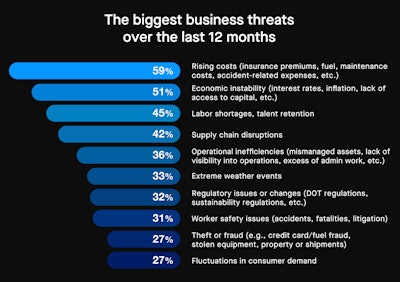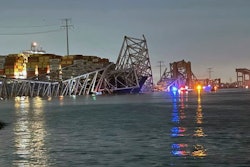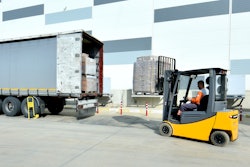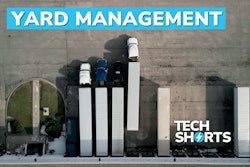
Rising costs and economic instability along with an increase in fraud, safety concerns and a scarcity of skilled labor have plagued the physical economy over the past year. Those challenges have led to an average of more than $1 million in losses across the industries of construction, oil and gas, manufacturing, retail and others, and the trucking industry in particular lost $1,040,023 in the last 12 months.
That’s according to the inaugural Motive Physical Economy Outlook 2024 report that surveyed 1,000 leaders across the physical economy with 25% of respondents from the trucking sector. The survey found that leaders in these industries are looking to artificial intelligence and other technology in 2024 to turn the tide against these factors.
“They see updated technology and operational efficiencies among the top opportunities for physical operations in 2024, along with this, increases in demand and economic stability,” said Motive Chief Customer Officer Ryan Plutnicki. “What this tells us is that they see the opportunity for better visibility and control through technology (like AI) to address the variables they can and best weather these top stressors and be ready for when they ease.”
The top five opportunities for physical operations over the next 12 months include updated technology and software (33%), economic stability (31%), supply chain improvements (31%), increase in demand (30%) and operational efficiencies (29%). AI is one of the biggest components in updated technology, according to the report, which found these five areas to have the most value in the coming year: tracking assets and vehicles (43%), more accurate decision-making (40%), expense planning (39%), reducing administrative work (39%), and detecting fraud (38%).
The report also shows that 69% of physical operations leaders think AI will have a positive impact on their jobs, and nearly a third expect AI to address labor shortages. Addressing safety concerns, 73% of respondents agree that roads are safer with AI-enabled cameras, and 64% say AI is crucial for preventing accidents and coaching drivers.
Construction and trucking see the top benefit of AI to be tracking assets and vehicles and optimizing utilization, Plutnicki said. Another survey, Verizon Connect's annual Fleet Technology Trends Report, had a similar finding. Four out of five respondents indicated they use at least one form of fleet technology, including GPS tracking solutions that can optimize routes that help drivers accomplish more each day, thereby reducing the hiring need. More than half of respondents worldwide (56%) said GPS tracking solutions helped boost driver productivity, and 38% of respondents globally said GPS tracking solutions improved preventive maintenance to keep vehicles roadworthy longer.
“Not all vehicles can be replaced, and not all labor gaps can be filled, but fleets can get more out of existing fleet, equipment and labor assets by investing in smart solutions like asset tracking and EV technology,” said Peter Mitchell, senior vice president and general manager at Verizon Connect. “Fleet management technology now can be a bridge to hiring and vehicle replacement later by making fleets more efficient and profitable.”
[RELATED: The year of the rebound: Fleets move to adopt more technology]
Plutnicki said, based on a breakdown of the data in the Motive report pertaining to the trucking sector alone, that 44% of trucking leaders say they plan to invest in fleet management software in the next 12 months.
The survey found that nearly half (46%) of leaders in the physical economy as a whole are using more than ten individual tools to manage their operations, with 30% saying it’s too many to count. As a result, 58% say they spend most of their time dealing with reactive issues versus proactively managing their workers, fleet, spend or assets and equipment, and 44% of leaders admit to losing track of vehicles at least monthly.
“I don’t always know that my employees are safe or where my vehicles are,” said one fleet leader when asked what the No. 1 thing is that keeps them up at night. Another said “unoptimized efficiency of our fleet management operations, especially when it comes to integrating newer technologies.”
Going into 2024, Motive Co-founder and CEO Shoaib Makani said he expects to see companies in the physical economy to heavily invest in technology to improve operations because they acknowledge this lack of a single 360-degree view of their operations will continue to hamper their operations and ultimately their bottom lines.
"The need for transformation is evident, with limited visibility and data silos hampering profitability and heightening safety risks,” he said. “Leaders recognize technology, particularly AI, as a game-changer for automating proactive decisions, improving visibility and enhancing safety, effectively addressing industry challenges and presenting opportunities across this critical sector of our economy."











